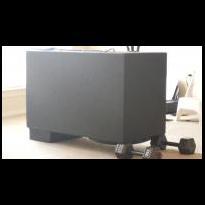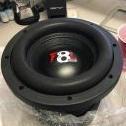Your posts say that you don't. VERY clearly.dude, i may not have a technical knowledge such as yourself. as you seem to know alot about this. what I'm wanting to know now is, how do you know what won't work if you've never tried it? is it just because your learnings say different, or because an app says that it won't work? i enjoy learning more when I'm trying different things. i don't understand how let's say a 12 can be any better than what I've gotten out of them. i could almost flip a quarter on the roof of my vw fox with 1 12 in a bandpass in the trunk, I'd say that's pretty good and i don't see how it could be any harder except with more power as that one only had around 400watts goin to it. it was a 600rms sub if i remember correctly. There are a number of fundamentals about speakers, acoustics, and their interaction with the environment they are playing in that tell a person who is well educated in the field whether or not a particular plan is even worth pursuing. That is the reference that many of the members responding in your post are going by when they say something won't work. Now, that being said, what sounds good and works satisfactorily for you may not sound good and work satisfactorily for anyone else. That also doesn't mean that your reference (i.e. the other systems you've listened and compared yours to) were or were not on the level either. All they're trying to say is that, due to how you've done your builds in the past, there's a VERY strong probability that a proper design for the driver(s) you used would have netted better results. like I've said, the bottom line is that I've never had a sub box that didn't sound good or hit hard. and I'm not ignorant to the potential of subs, i know when a sub isn't reaching it's full potential. so how could they be better if they are hitting hard and sounding good? by making sure they utilize the exact air space? I'm sure they where though, or else they wouldn't have sounded good, right? Again, sounding good and hitting hard to suit your personal preferences is not an exact measurement and the beat all end all answer, necessarily. Through your experimenting you may have found the sweet spot for your goals however that sound may not please everyone or through testing with equipment more output could have been gained by building differently. granted, i do not know as much as you about the correct spec building method, but i know how to measure a box and say, well that's 4cubes it's too much and back it down. I'm not just blindly throwing pieces of wood in a pile, squirting glue all over it and callin it a box! i do add some screws too! seriously though, if i make the port longer then it calls for, what's gonna happen exactly with the sound or feel of the bass? am i going to diminish the quality or the feel of it? i assumed it would sustain the notes longer. again this is me experimenting and just because you say it's not good isn't going to stop me from trying. Making the port longer changes the tuning and overall response of the enclosure. The exact effect it has on the sound can easily be calculated through the use of modeling software or good old hand calculations too. Without knowing all the specs of the driver, the enclosure, etc. there's no way to guess and know if it will diminish the quality or help it, diminish the output or help it, or anything else blindly like that. There's nothing wrong with experimenting and testing, but you can't generalize statements about past experiences applied to new builds and assume that everything you've done has been right and that everything to that has been said by the members of this forum to the contrary is wrong. you can build boxes to spec all day long and assume that something different isn't going to be good. but until you try and see for yourself, it's always just an assumption. That is precisely why modeling software exists. By modeling the driver in the different enclosures the assumptions are removed from the equation. However it does take some experience to understand exactly what the modeling tells you which is where doing the modeling coupled with the experimentation like you're doing/have done makes for a good education. I don't think anyone is saying that EVERYTHING you've done in the past is COMPLETELY wrong. The way you've done it may not have been the most efficient, and the way you've applied it over the years seems (from many of your responses) to have been misguided, but that doesn't mean anything moving forward from here. I can speak from experience that when everything you've been taught by others and learned on your own is suddenly found to be either wrong or questionable is a really hard pill to swallow. Sometimes the tact used by others to try to explain the things that are wrong isn't the best and it comes across aggressive or calloused but that doesn't make it any less correct. Everyone here only wants to help. If you're not ready to follow their suggestions or really learn about what they're saying that's fine but don't get defensive about it blasting back with information about how what you've done in the past worked and sounded so good to you. As I mentioned, sounding and working good for your goals is great, but that doesn't mean it absolutely couldn't have sounded better or gotten louder. Accepting that and opening your mind to really learning all the other possibilities will provide huge gains for your personal advancement in this hobby.





